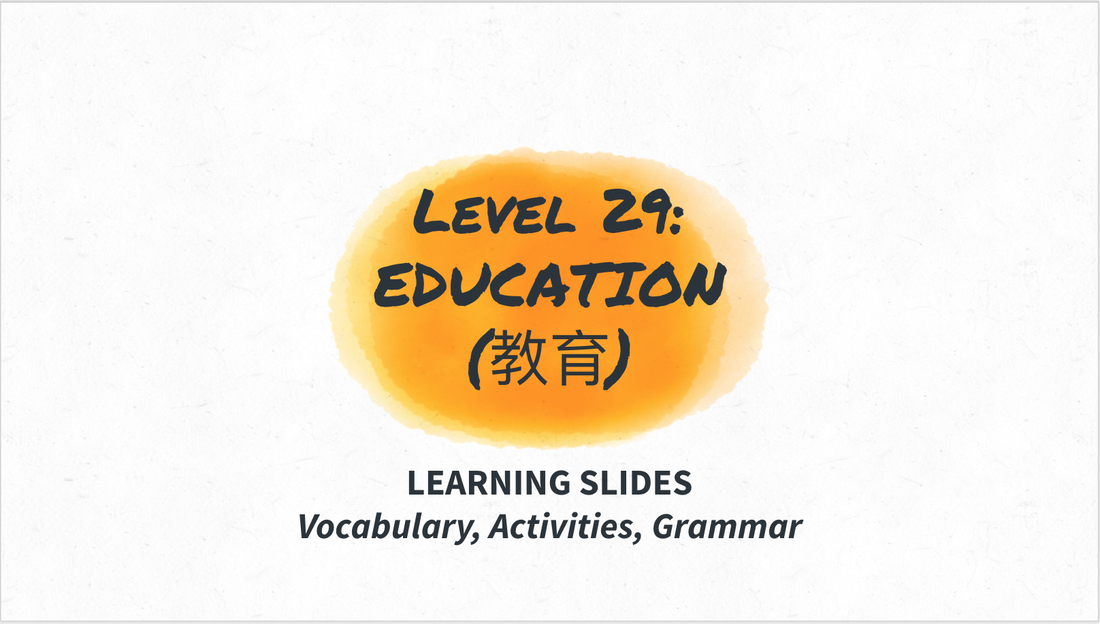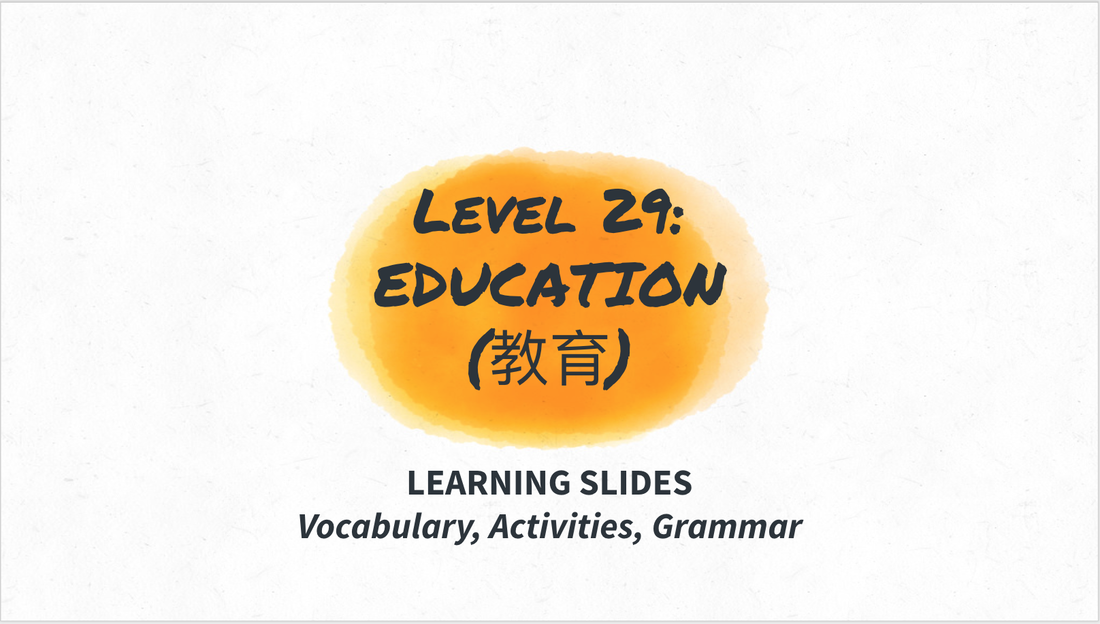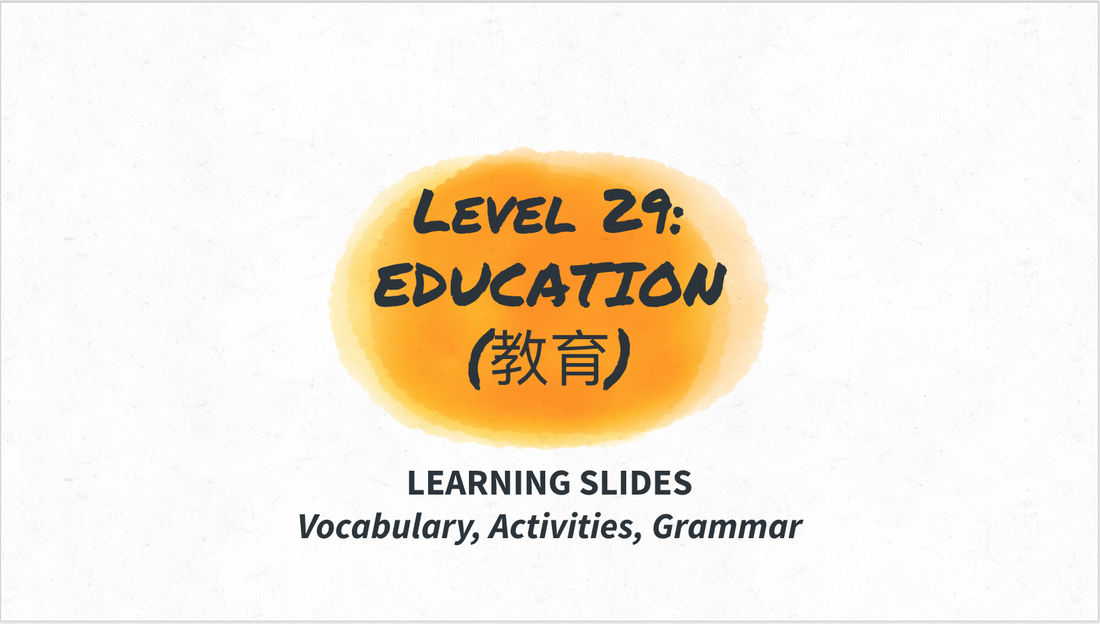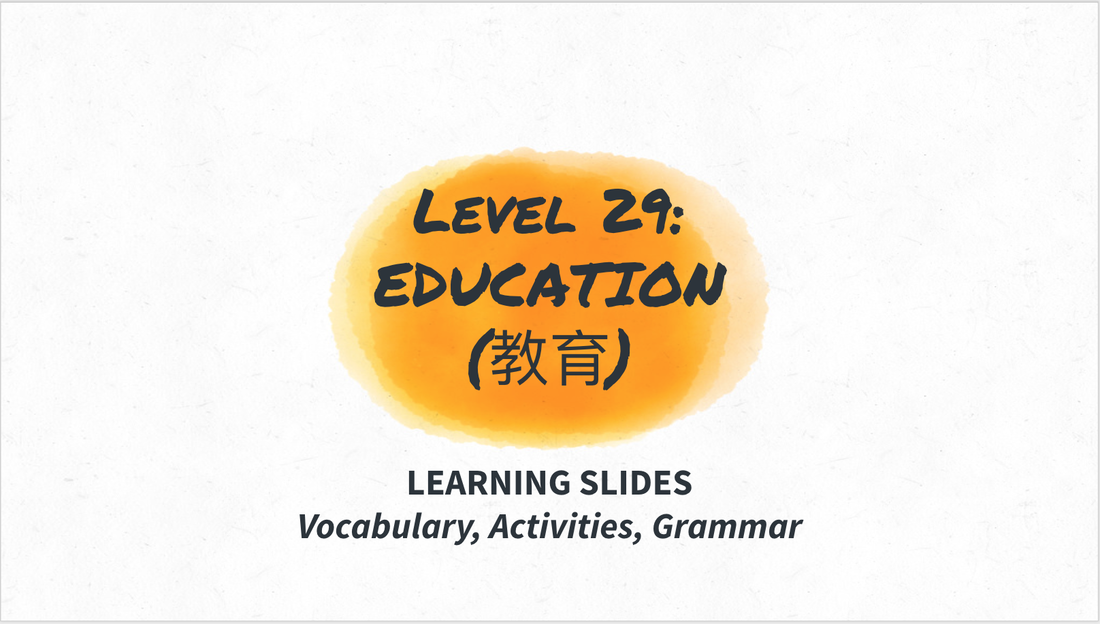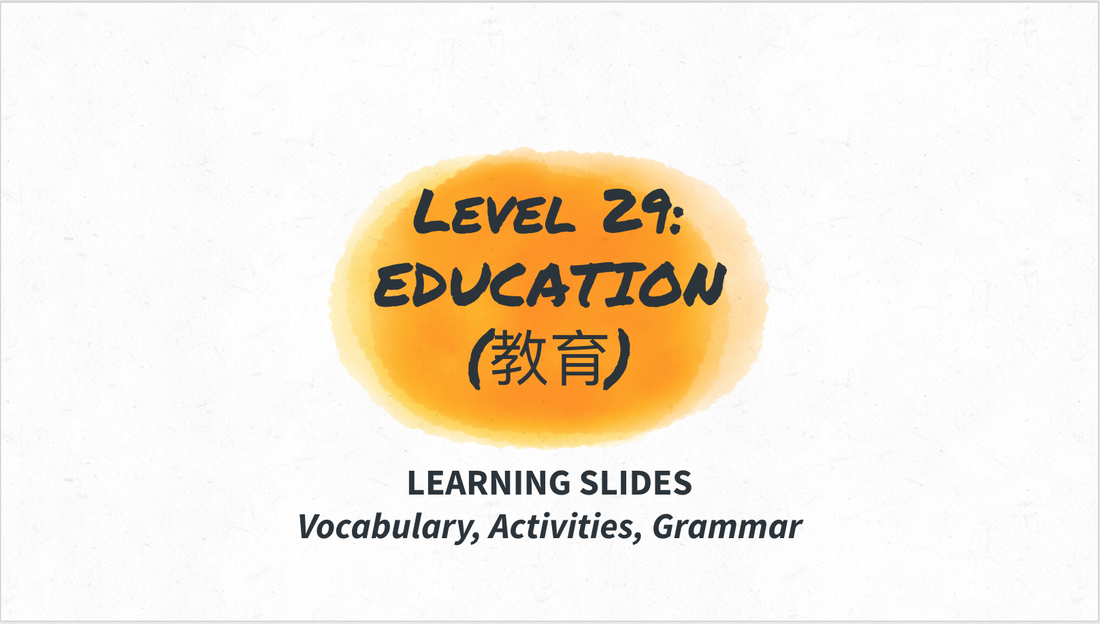Chapter 9: "The Gift of Life"
HOW TO DEFINE A HAPPY CHILDHOOD
Preview
Lesson
Practice
Mastery
Preview
理解 (lǐ jiě) to understand
看法 (kàn fǎ) point of view
童年 (tóng nián) childhood
幸福 (xìng fú) happiness, well-being; fortune
幸福 vs. 快乐 vs. 高兴:
幸福 (xìng fú) = "to feel contented with life."* It denotes a state of mind that has lasted for an extended period of time.
快乐 (kuài lè) = "the happiness one feels when one's needs and concerns have been addressed and taken care of."* It is not necessarily externalized, and can be a more sustained happiness than that suggested by 高兴.
高兴 (gāo xìng) = "one's state of mind upon seeing someone they like or experiencing something they find gratifying."* It can be externalized and possibly temporary.
- 我不完全同意,但是我能理解。
看法 (kàn fǎ) point of view
- NOTE: “看法” expresses your opinion or view on something, it’s totally different from “办法” or “做法”
- 没想到你跟嫂子的看法一样!你同意我嫂子的做法?Who knew you would have the same view as my sister-in-law! Does that mean you agree with my sister-in-law’s methods?
- 我的看法是... 两个都重要。
童年 (tóng nián) childhood
- 童=儿童(ér tóng) = more formal way of saying child
- 可是到现在我也不清楚,孩子到底是将来“成龙”,“成凤”好,还是又一个快乐的童年好?
- 我嫂子整天要她学这学那,可是我哥哥反对给孩子太大的压力,他认为对孩子来说,最重要的是有一个快乐的童年。
幸福 (xìng fú) happiness, well-being; fortune
- 哥哥和嫂子结婚十多年了,生活一直很幸福。= Li Zhe’s older brother and sister-in-law got married over ten years ago, their lives are truly happy.
- The three words “幸福”,”快乐”,”高兴” can all be translated as "happiness." However, there are differences in usage.
幸福 vs. 快乐 vs. 高兴:
幸福 (xìng fú) = "to feel contented with life."* It denotes a state of mind that has lasted for an extended period of time.
- 幸福 also has the additional meaning of "fortune" or "blessing."
- Ex. 小王和小李结婚以后,生活一直很幸福。[their life has always been very happy]
快乐 (kuài lè) = "the happiness one feels when one's needs and concerns have been addressed and taken care of."* It is not necessarily externalized, and can be a more sustained happiness than that suggested by 高兴.
- 快乐 is also used in celebratory greetings like 新年快乐 and 生日快乐.
- Ex. 暑假回到父母家,有好吃的,有老同学一起玩儿,她很快乐。[she was very happy]
- Ex: 上大学以后,他一直不快乐,因为他想家,想朋友。[he's been unhappy because he misses friends and family]
高兴 (gāo xìng) = "one's state of mind upon seeing someone they like or experiencing something they find gratifying."* It can be externalized and possibly temporary.
- Ex: 听说好朋友周末来看他,他非常高兴。[he was very glad]
- Ex: 你刚才还在笑,现在怎么不高兴了?[why are you unhappy now?]
Lesson
Practice
Mastery
DICTATION: write the Chinese characters, English definition, and pinyin (including tones):
GRAMMAR: complete the following exercises:
READING: read aloud the following sentences:
SPEAKING: perform the following conversation tasks:
- 理解,看法,童年,幸福
- TARGET: no more than 1 mistake, including tones.
GRAMMAR: complete the following exercises:
- Rule (in English): Compare and contrast the words "办法" vs. "看法" vs. "做法." Give examples of the usage of each word.
- Rule (in English): Compare and contrast the words "幸福" vs. "快乐" vs. "高兴." Give examples of the usage of each word.
- Detective (find and fix the mistakes): 小王和小李结婚以后,生活一直很高兴。
- Detective (find and fix the mistakes): 你刚才还在笑,现在怎么不幸福了?
- Detective (find and fix the mistakes): 祝你新年幸福!
- TARGET: no grammar mistakes.
READING: read aloud the following sentences:
- 我不完全同意,但是我能理解。
- 没想到你跟嫂子的看法一样!你同意我嫂子的做法?
- 我嫂子整天要她学这学那,可是我哥哥反对给孩子太大的压力,他认为对孩子来说,最重要的是有一个快乐的童年。
- 哥哥和嫂子结婚十多年了,生活一直很幸福。
- TARGET: no more than 1 mistake, including tones.
SPEAKING: perform the following conversation tasks:
- Discuss how to define a “happy childhood.”
- Discuss different ways or perspectives of looking at things.
- TARGET: at least a 3 on ALL tasks.
Chapter 10: "Story of More Woe"
HOW TO DISCUSS FREEDOM OF CHOICE
Preview
Lesson
Practice
Mastery
Preview
|
|
厉害 (lì hai) terrible; formidable
吵得很厉害 to fight terribly 尊重 (zūn zhòng) to respect
选择 (xuǎn zé) choice; to choose
一直 (yì zhí) [adverb] all along; continuously
|
Lesson
Practice
Mastery
DICTATION: write the Chinese characters, English definition, and pinyin (including tones):
READING: read aloud the following sentences:
SPEAKING: perform the following conversation tasks:
- (吵得很)厉害,尊重,选择,一直
- TARGET: no more than 1 mistake, including tones.
READING: read aloud the following sentences:
- 乖孩子应该尊重父母,尊重老师!
- 她说小孩子也是人,有自己的爱好和兴趣,家长应该尊重孩子自己的选择。
- 哥哥和嫂子结婚十多年了,生活一直很幸福。
- TARGET: no more than 1 mistake, including tones.
SPEAKING: perform the following conversation tasks:
- Discuss a child’s freedom of choice.
- TARGET: at least a 3 on ALL tasks.
Chapter 11: "The Secret"
HOW TO TALK ABOUT EDUCATIONAL SUCCESS
Preview
Lesson
Practice
Mastery
Preview
|
|
知识 (zhī shi) knowledge
硕士 (shuò shì) master's degree
博士 (bó shì) Ph.D; doctor
学位 (xué wèi) degree
|
Lesson
Practice
Mastery
DICTATION: write the Chinese characters, English definition, and pinyin (including tones):
READING: read aloud the following sentences:
SPEAKING: perform the following conversation tasks:
- 知识,硕士,博士,学位
- TARGET: no more than 1 mistake, including tones.
READING: read aloud the following sentences:
- 孩子最好还是在学校多学一些知识。
- 可是你别忘了,有些知识不是从书上学的,而是从社会、从生活中学的。
- 李哲的嫂子十五年前从香港来美国留学,拿到硕士学位以后找到工作。
- 哥哥是电脑博士,自己设计,管理网站。
- TARGET: no more than 1 mistake, including tones.
SPEAKING: perform the following conversation tasks:
- Talk about ways to acquire knowledge: does it come from books, or from life?
- Talk about educational success (including getting different degrees).
- TARGET: at least a 3 on ALL tasks.
Chapter 12: "He Who Plants Kindness"
HOW TO TALK ABOUT COMMUNITY SERVICE
Preview
Lesson
Practice
Mastery
Preview
义工 (yì gōng) "voluntary work"; volunteer [person]
志愿者 (zhì yuàn zhě) volunteer [person]
社团 (shè tuán) club; union; association
俱乐部 (jù lè bù) club
**社区服务** (shè qū fú wù) community service
- 做义工 = to volunteer
- 当义工 = to work as a volunteer
- 学生义工 = student volunteers
志愿者 (zhì yuàn zhě) volunteer [person]
- 志愿 = to volunteer; to do smth of one's own free will
- 者 = suffix after a word to indicate a class of persons ("one who is/does [...]")
- 读 = to read, 读者 = reader
- 爱好 = hobby,爱好者 = hobbyist, fan
- 记 = to record or remember,记者 = journalist ("one who records")
- NOTE: "者" is a bound morpheme which means "the one who has this nature or action." For an excellent and detailed explanation of how it's used in Chinese, see this link.
社团 (shè tuán) club; union; association
俱乐部 (jù lè bù) club
- This is a loanword from English
- A "俱乐部" is more of a club for fun or recreation (i.e. 网球俱乐部). The term “社团” is often used within a school and is the more common term for a school or student club.
- Both 俱乐部 and 社团 can be considered organizations around shared interests.
**社区服务** (shè qū fú wù) community service
Lesson
Practice
WRITE: write a short essay about your experiences volunteering or doing community service.
SKIT: in a group, write a dialogue between two friends. Memorize your skit and perform in front of the class!
SKIT: in a group, write a dialogue between two friends. Memorize your skit and perform in front of the class!
- One friend loves volunteering and community service, and participates in many kinds of volunteering.
- The other friend opposes volunteering. He will only work for pay! However, he does like joining clubs for fun.
- Get into a fierce debate over the worth of volunteering vs. paid work.
Mastery
DICTATION: write the Chinese characters, English definition, and pinyin (including tones):
GRAMMAR: complete the following exercises:
SPEAKING: perform the following conversation tasks:
- 义工,志愿者,社团,俱乐部,*社区服务*
- TARGET: no more than 1 mistake, including tones.
GRAMMAR: complete the following exercises:
- BONUS: Rule (in English): Explain what the "-者" suffix is, and how it's used in Chinese. Provide at least two example words.
- TARGET: no grammar mistakes.
SPEAKING: perform the following conversation tasks:
- Talk about joining school clubs or associations.
- Discuss volunteering and community service.
- TARGET: at least a 3 on ALL tasks.
Chapter 13: "Make Your Dream Come True!"
HOW TO DEBATE THE PROS AND CONS OF AFTER-SCHOOL PROGRAMS
Preview
Lesson
Practice
Mastery
Preview
|
|
侄女 (zhí nǚ) brother's daughter
嫂子 (sǎo zi) older brother's wife
|
Lesson
Practice
FAMILY RESEARCH: check out this cool tool for Chinese family terms. Enter your relationship with a relative and find out what the Chinese word for that person is!
DEBATE: discuss the pros and cons of after-school programs. Take a strong position on each side.
WRITE: write a story about an after-school program gone... wrong.
DEBATE: discuss the pros and cons of after-school programs. Take a strong position on each side.
WRITE: write a story about an after-school program gone... wrong.
Mastery
DICTATION: write the Chinese characters, English definition, and pinyin (including tones):
READING: read aloud the following sentences:
SPEAKING: perform the following conversation tasks:
- 侄女,嫂子
- TARGET: no more than 1 mistake, including tones.
READING: read aloud the following sentences:
- 哥哥和嫂子结婚十年了,生活一直很幸福。
- 你有侄女?今年多大了?
- 我侄女才小学三年级,我嫂子就把她的时间安排得满满的。
- TARGET: no more than 1 mistake, including tones.
SPEAKING: perform the following conversation tasks:
- Describe the (specific) family relationships between a 嫂子 and a 侄女.
- Debate the pros and cons of after-school programs.
- TARGET: at least a 3 on ALL tasks.
MINIBOSS #3: ACT 3 REVIEWMastery Challenge 1 (Vocabulary and Grammar):
Mastery Challenge 2 (Speaking):
BONUS CHALLENGES:
|
© 2019 Hugo Xiong. [email protected]

